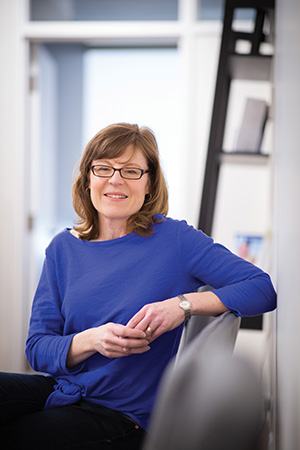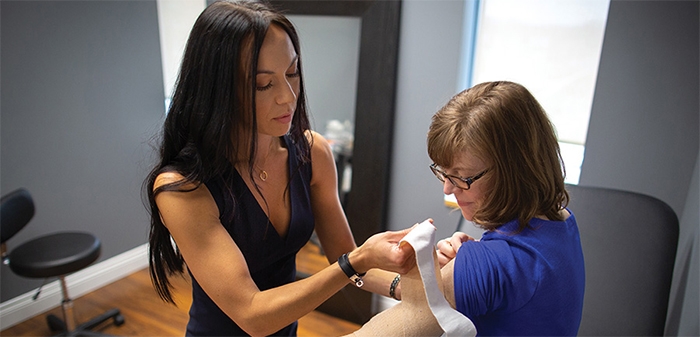Jennifer McLaughlin first noticed a small, dry patch of skin on her upper left bicep six or seven years ago. At the time, her family doctor wasn’t concerned and diagnosed it as dermatitis. But last year she noticed a few bumps had appeared on the patch.

While she wasn’t panicked, her family doctor referred her to a dermatologist. The dermatologist examined the lesion and, five weeks later, removed it. And a week after she had the lesion removed she got a call confirming it was melanoma — an aggressive form of cancer that develops from DNA damage to skin cells, leading to the formation of malignant tumours.
“I went to my computer and started researching melanoma and became immediately overwhelmed and terrified, because this word ‘aggressive’ kept coming up,” says Jennifer, who spent the next day trying to process what that meant for her, her husband and their three children, aged 12 to 15.
“For anybody who hears the word ‘cancer’ or ‘melanoma,’ every day feels like an eternity, so the faster they receive diagnosis and treatment, the better it is for positive outcomes,” says Tracie Scott, director of surgical services at MSH.
Jennifer only had to wait two days for her first appointment at MSH’s new melanoma clinic. Officially opened in April 2019, the clinic brings together the hospital’s surgical, diagnostic and oncology expertise with the aim to reduce wait times for analyzing skin lesions and treatment of melanoma by improving access to specialists and surgeons.
“There are very few options for treating melanoma in Ontario, which is why we decided this is an important service to offer. Sunnybrook has one of the only specialized melanoma clinics in the GTA, which leaves a huge gap,” says Tracie. “Our primary goal is to provide better access to care and reduce wait times.” If treated early enough, melanoma is almost always curable.
The clinic takes a multidisciplinary approach, where a patient meets their entire care team — general surgeon, plastic surgeon, pathologist and oncologist — at once, during the same appointment. “Patients receive a really robust care plan individualized for them,” says Tracie.
The clinic is collaborating with Sunnybrook, and learning from the expertise of MSH’s Dr. Tara Lynn Teshima, a plastic surgeon specializing in adult
craniofacial surgery.
“I felt very reassured and informed from my first appointment onward”
“Toronto is inundated and wait lists are going up [for skin cancer treatment],” says Dr. Teshima. “I realized we can help patients in Markham if we developed our own multidisciplinary clinic and offer all aspects of treatment, including complex head and neck skin cancer where reconstruction is required.”
By reducing wait times, this could potentially result in expedited biopsies and earlier diagnoses. “Because our specialists and surgeons are seeing the patient at the same time, a plan is organized very quickly and that patient will often leave their first appointment knowing what needs to be done, with a surgery date scheduled faster than provincial guidelines,” says Dr. Teshima.
The goal is for patients to be seen by all specialists in one appointment, followed by surgery within one to two weeks. “We’re hoping to be an example of what is possible and what should be done for patients with serious melanoma conditions,” says Dr. Teshima.
“Our diagnostic specialists are pleased to collaborate as part of this dedicated interprofessional team and to see patients receive more timely treatment,” says Lynne Campkin, director of diagnostic and laboratory services at MSH. “This type of cancer can be effectively treated with access to the appropriate services.”
The new melanoma clinic at MSH will incorporate a patient database to collect data on outcomes and rates of recurrence and could collaborate with Sunnybrook on clinical trials for related medications.The database will also keep track of patients for ongoing follow-up appointments.
“It’s not just treating the immediate lesion; these patients often require longterm follow-up,” says Dr. Teshima. “We’re starting a patient database so we can capture patient information, so no matter what, the patient will always be called at the six to 12 month mark. The goal is that no patients are lost in follow-up.”
In less than a month, Jennifer went from melanoma diagnosis to surgery to recovery. Less than two weeks after her surgery, she received another call: this time she was told the surgery removed all traces of cancer.
“Before my diagnosis, I would have guessed that the process of navigating the healthcare system for a cancer patient is completely overwhelming and intimidating. My experience was not like that at all,” says Jennifer. “I felt very reassured and informed from my first appointment with Dr. Teshima onward. She and all the other doctors, nurses and hospital staff have been wonderful.”
Jennifer will be part of the patient database, ensuring she receives ongoing follow-up care. “In the grand scheme of things I was so thankful that in a month’s time I was on the road to recovery,” she says. “I came out feeling very thankful that we now have this clinic in our community.”
